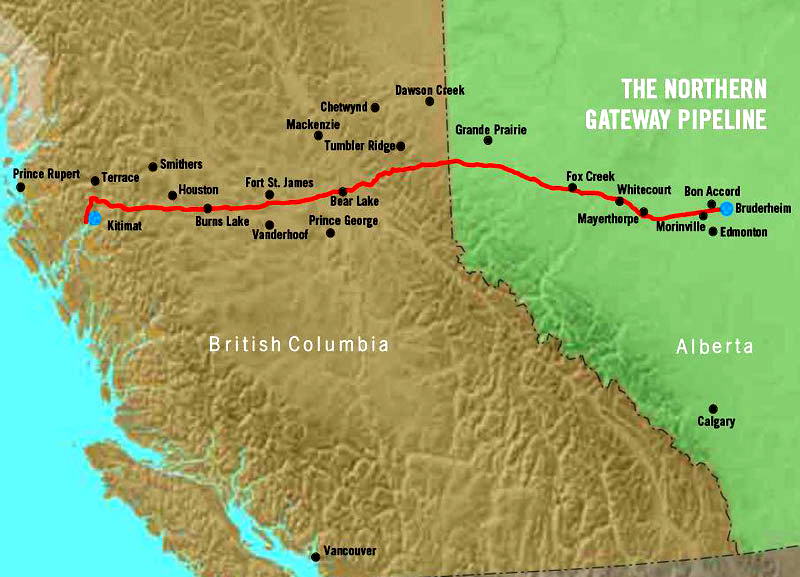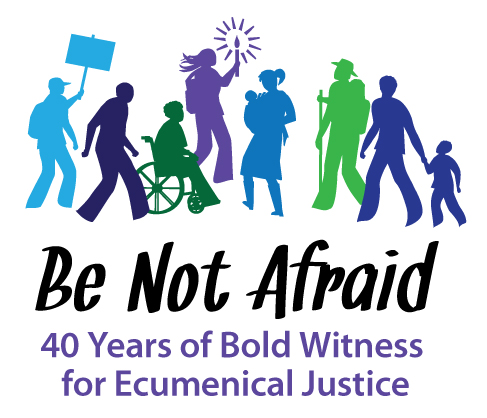|
|
February 2014
IN THIS ISSUE
- Let's Make Canada Open for Justice!
- How will you show your love on February 14?
- URGENT ACTION: Indigenous Partner at Risk in Colombia
- Joint Review Panel Report on Proposed Northern Gateway Pipeline Project Downplays Indigenous and Ecological Concerns
- Hupacasath First Nation Appeals Court Decision re FIPA
- Coming Into the Watershed: A Watershed Discipleship Retreat
- Honouring Indigenous Women, Volume 2
FEATURE PARTNER
Angelina Choc
FEATURE RESOURCES
The Blanket Exercise: The Indigenous Rights history we've never been taught
REFLECTION
Unbearable Pain, Startling Hope: 40 years of Bold Witness to Ecumenical Social Justice – by Jennifer Henry
|
|
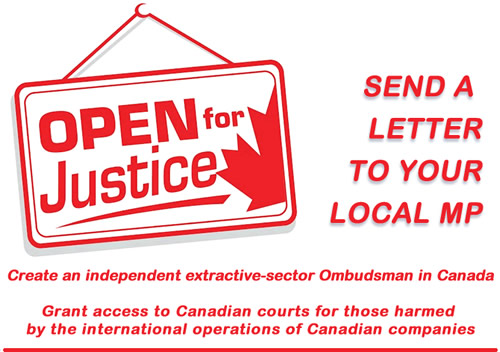 |
In early December KAIROS, along with its partners in the Canadian Network on Corporate Accountability (CNCA), launched a national MP letter writing campaign to make Canada “Open for Justice.” Canada is home to the majority of the world’s mining and mineral exploration companies, but there is no legal accountability in Canadian law for the actions of Canadian mining companies abroad. This has led to numerous conflicts and abuses of the rights of citizens, workers and Indigenous peoples struggling to defend their rights and protect watersheds and ecosystems.
The Open for Justice campaign
has a simple objective: the creation of two new accountability mechanisms in Canada.
1) An extractive-sector Ombudsman with the power to independently investigate complaints and make recommendations to corporations and the Government of Canada; AND
2) Legislated access to Canadian courts for people who have been seriously harmed by the international operations of Canadian companies.
Since starting our letter writing campaign over 550 supporters of these mechanisms have sent letters to their MP using our online application. And we're still getting more letters every day!
Please join us in defending the rights of citizens, workers and Indigenous peoples around the world.
|
How will you show your love on February 14? |
On February 14, send a valentine to your elected representative asking them to ‘Have a Heart’ for First Nations children and youth.
Shannen Koostachin was a courageous girl from Attawapiskat First Nation who believed “school is a time for hopes and dreams of the future. Every kid deserves this.” She led a movement for safe and comfy schools with culturally-based education for First Nations children and youth before tragically passing away in 2010 at the age of 15. Her legacy has lived on in the Shannen’s Dream movement.
We are a long way from achieving Shannen’s dream; not only do schools on reserves receive less funding per student but they receive no funding for libraries, language programs, computers or extracurricular activities. Many First Nations children go to school in buildings that are mouldy, unheated and that pose serious health risks. On February 14, send the Government of Canada an e-valentine that says more effort is needed to address the gap in services available to children on reserve.
|
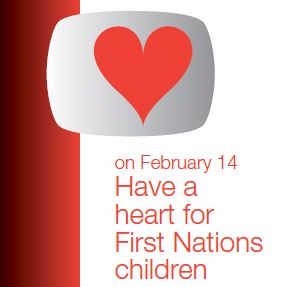 |
As well, on February 14 you can stream ‘Hi-Ho Mistahey!’, the National Film Board documentary about Shannen’s Dream, for free!
Have a Heart Day is an initiative of the First Nations Child and Family Caring Society.
For more info visit their site or contact:
Katy Quinn,
Indigenous Rights Program Coordinator
kquinn@kairoscanada.org
613-235-9956 ext. 224. |
URGENT ACTION: Indigenous Partner at Risk in Colombia |
|
A few weeks ago KAIROS issued an urgent action calling for letters of support for Embera Chamí Indigenous leader, Flaminio Onogama Gutiérre from Colombia who had travelled to Canada in 2010 as part of a KAIROS co-sponsored tour. Thank you to everyone who has already responded. The response was immediate, inspiring and coast-to-coast. Flaminio’s life continues to be at risk so we are re-circulating the urgent action.
If you have not already, please take a few minutes and write a letter.
Thank you. These letters do make a difference.
|
|
According to reports from Amnesty International, Flaminio is currently in hiding after the bodies of two family members were found stabbed to death and with evidence of torture.
In December 2010, Flaminio came to Canada as Human Rights Counsellor of the ONIC (National Indigenous Organization of Colombia). He was part of an Amnesty International tour that was co-sponsored by Rights and Democracy and KAIROS. On that tour, Flaminio spoke at a large public event in Toronto, at the KAIROS “Beat the Drum” Day of Action for Indigenous Rights in St John New Brunswick and at meetings of KAIROS and the Atlantic Regional Solidarity Network (ARSN) in Halifax and Tatamagouche. He also travelled to Ottawa for meetings with the Assembly of First Nations, parliamentarians and representatives from foreign affairs.
Flaminio has spoken to many Canadians and has met many of you in the KAIROS network.
During their visit to Canada, Flamino and Dora Tavara, the women’s coordinator at the ONIC, spoke forcefully about the human rights crisis faced by Indigenous peoples in Colombia and ONIC’s Palabra dulce, aire de vida' (Sweet words, breath of life) campaign to end the ongoing threats against Indigenous peoples in Colombia. More than one third of the 102 distinct Indigenous peoples in Colombia are at risk of extinction as a result of the ongoing conflict and the encroachment of resource extraction projects on their land. The situation is so bad that following his visit to Colombia in 2010, the United Nations Special Rapporteur on the Rights of Indigenous people assessed the situation as so “critical and profoundly worrying” that he recommended an investigation by the UN Special Adviser on the Prevention of Genocide. |
Please see Amnesty’s urgent action page to write a letter to the government of Colombia
KAIROS' official letter to President Santos.
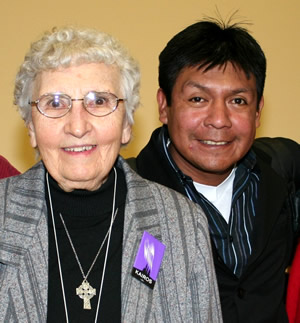
Flaminio Onogama Gutierrez with Sister Angie Martz at the KAIROS Beat the Drum for Indigenous Rights event in
St John, New Brunswick, Dec 5 2010.
|
|
For more information please contact:
Rachel Warden
Gender justice & Latin America Partnerships Program Coordinator
rwarden@kairoscanada.org
416-463-5312 x 242
Toll-free: 1-877-403-8933
|
Joint Review Panel Report on Proposed Northern Gateway Pipeline Project Downplays Indigenous and Ecological Concerns |
The joint review panel appointed by Environment Canada and the National Energy Board has recommended that the Enbridge Northern Gateway pipeline project be allowed to proceed as long as it meets 209 required conditions.
The panel’s endorsement comes despite the fact that 96% of written submissions and 1159 presenters spoke out against the project; only two presenters were in favour of the pipeline.
The report appears to fall short of the test established by the Anglican Bishops of British Columbia and the Yukon who in 2012 urged serious study of the concerns of Indigenous communities and stated, “In a project of this magnitude, it is imperative that the final [report] … be credible and command wide public support.”
As Grand Chief Stewart Phillip, President of the Union of B.C. Indian Chiefs, said, “Today’s recommended approval with conditions stems from a fundamentally and fatally flawed process where as a matter of record, the overwhelming majority of presentations made to the Panel here in B.C. expressed grave concerns, distressing facts and a shared belief the project should not proceed. The Northern Gateway Project is being vehemently opposed by Indigenous Peoples who will not put their territories, waters and communities at risk.”
The report downplays Indigenous peoples' concerns about the disastrous consequences of a large oil spill like the one that dumped nearly one million gallons of diluted tar sands bitumen from an Enbridge pipeline into the Kalamazoo River in Michigan in 2010. The panel says such a spill is “unlikely” and its “adverse effects would not be permanent or widespread.”
While the report gives weight to Enbridge’s offer to loan money to Aboriginal groups to purchase equity in the pipeline in the hope of sharing in future profits, it ignores the stated positions of native leaders such as Chief Larry Nooski of the Nadleh Whut’en First Nation who has declared “Our lands and waters are not for sale, not at any price.” Similarly, Pete Erickson, a councillor from the Nak’azdli First Nation, told Enbridge’s annual meeting, “We do not want your money. … I’m asking you … [to] respect our traditional law governing our own lands for us to determine our own future.”
Respect for Indigenous Peoples' right to give or withhold free, prior and informed consent before a resource project of this magnitude can proceed across their territories is a fundamental principle of justice. This right is enshrined in the UN Declaration on the Rights of Indigenous Peoples, which has been endorsed by the Government of Canada.
Similarly, the need to curb greenhouse gas emissions to prevent runaway climate change is a fundamental principle of ecological integrity. But the panel’s narrow terms of reference allowed it to ignore the consequences for the climate of increased bitumen extraction. Building a pipeline with the capacity to export up to 525,000 barrels a day of diluted bitumen necessarily involves a substantial expansion of tar sands operations.
Since 2010, KAIROS has called for a halt to new approvals for tar sands projects. If current plans for expansion of tar sands production proceed, by 2020 they will add an additional 72 megatonnes (Mt) of carbon dioxide to the atmosphere relative to 2005 emission levels. This would more than cancel out the 67 Mt of reductions expected from Canada’s other industry sectors and make it impossible for Canada to meet even its modest emission reduction target. In addition to the added greenhouse gases that would be emitted within Canada, if the Northern Gateway pipeline were to operate at capacity, combustion abroad of the oil it would carry would add another 82 Mt of carbon dioxide to the atmosphere each year.
For background information see our Ethical Reflections on the Northern Gateway Pipeline.
For more information please contact:
John Dillon
Ecological Economy Program Coordinator
jdillon@kairoscanada.org
416-463-5312 x 231
Toll-free: 1-877-403-8933
|
Hupacasath First Nation Appeals Court Decision re FIPA |
Exercising its constitutional right to be consulted on decisions affecting its ancestral lands, the Hupacasath First Nation has appealed a federal court’s decision dismissing its request for a review of the Canada-China Foreign Investment Protection Agreement (FIPA).
As explained in our September 2013 Briefing Paper First Nations Challenge Foreign Investment Protection Agreements, the Hupacasath First Nation located on Vancouver Island initially asked the court to stop the federal government from proceeding with an agreement that would allow Chinese firms to bring investor-state suits against Canada if any level of government were to undertake a measure deemed to restrict the firms’ interests, such as access to natural resources, whether oil, natural gas, fish or forest products.
As Brenda Sayers, a member of the Hupacasath FN told the KAIROS Elements of Justice gathering in October, her small First Nation is also fighting on behalf of all Canadians whose ability to decide on resource projects that threaten widespread ecological destruction would be compromised by the FIPA.
A brief video of Brenda Sayers asking Canadians to support the court appeal may be found at the following link http://westandtogether.ca/
For more information please contact:
John Dillon
Ecological Economy Program Coordinator
jdillon@kairoscanada.org
416-463-5312 x 231
Toll-free: 1-877-403-8933 |
Coming Into the Watershed:
A Watershed Discipleship Retreat
|
Friday, May 9 (6pm supper) to Sunday, May 11 (1 pm)
Calling Lakes Centre, Fort Qu’Appelle, SK
Sponsored by KAIROS and the Calling Lakes Centre
|
|
A watershed is an area of land whose lakes and rivers all drain out to a common body of water. It can be as small as the Lower Qu’Appelle (the local watershed where Calling Lakes is located) or as big as the Hudson Bay watershed, which stretches from the BC-Alberta border across the prairies and Canadian Shield to the Quebec-Labrador border, and North to parts of Baffin Island.
But the word “watershed” also refers to time, as in a “watershed moment” – the time when it becomes clear that something is changing, or has to change.
KAIROS’ “Watershed Discipleship” program explores both these meanings of watershed through the lenses of ecological justice and Indigenous Rights. What are the watersheds we live in? With whom and what do we share those spaces? How can this awareness deepen our connection to our home place? How do watersheds connect us, both locally and globally? What threatens our watersheds, and how will we work together to protect them?
|
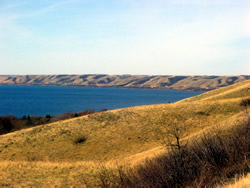 |
We’ll explore all these issues in this retreat, incorporating activities such as teachings from Indigenous leaders, biblical and theological explorations, field trips in the Lower Qu’Appelle watershed, sharing stories of our own watersheds, and time for reflection and worship. You’ll learn how watersheds are an important way to root yourself geographically and spiritually, and you’ll obtain skills to take back home to help others explore and protect the richness of your own watershed.
Please join us in this learning experience for all, organizers and leaders included, as we work towards right relationship with one another and with the land.
Registration: $200 (subsidized by KAIROS). To register, contact the Calling Lakes Centre: http://www.callinglakes.ca
For more information please contact:
Sara Stratton
Member Relations/Movement Building Coordinator
sstratton@kairoscanada.org
416-463-5312 x241
Toll-free:
1-877-403-8933 x 241 |
Honouring Indigenous Women, Volume 2 |
Through the Women of Courage program KAIROS supported the publication of Honouring Indigenous Women, Volume 2, writings by Indigenous women compiled by the Sound of my Heart Collective. On February 12, this publication will be celebrated and launched in Toronto.
This beautiful and deeply moving anthology includes creative writing and visual arts by Indigenous women alongside their allies from many nations across Turtle Island (North America). It was made possible by over 60 writers and artists reflecting and sharing their lived experiences related to their relationships with the land, birth mothers, families, communities, and themselves.
Learn more and/or purchase this amazing volume by clicking here.
For more information please contact:
Rachel Warden,
Women of Courage Program Coordinator
rwarden@kairoscanada.org
416-463-5312 ext 242
Katy Quinn,
Indigenous Rights Program Coordinator
kquinn@kairoscanada.org
613-235-9956 ext 224 |
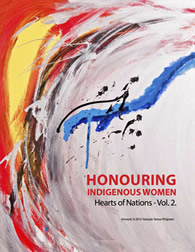 |
|
|
|
FEATURE PARTNER
Angelica Choc
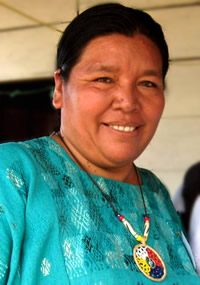
In November, the Guatemala Study Tour met with Angelica Choc and others in the nickel-rich region of of El Estor to learn about the impact of Canadian mining companies. Angelica is Maya Q’eqchi’ from Barrio La Unión. She is a grandmother of four and a mother of five. Four years ago, on 27 September 2009, Angelica’s husband, Adolfo Ich Chaman, a teacher and community leader, was killed. Today, Angelica is struggling for justice for her husband. She is making legal history by taking her case to a Canadian court . Angelica’s testimony is the subject of the new film Defensora, which was released last October.
In her blog from the Guatemala Study Tour, delegate Barbara Fullerton wrote:
The welcome and introductions led by Maria and her sister, Angelica Choc, took an hour and a half — precious, but necessary, time for all of us to have a sense of who was gathered there. Both women and their co-worker Raul are well-known (and harassed) for their roles in the equipo defensora. The names of those who risked attending from communities are not listed here to avoid the possibility of reprisals.
The pastor expressed appreciation for the name of our “United” church several times that morning. He said the name is significant since religion is so often used to divide people.
During the morning, we heard stories of assault, rape, and killing beginning over fifty years ago when mining first arrived in El Estor. We heard testimonies of a series of events on Sunday, 27 September 2009, the day Adolfo Ich, beloved teacher, community leader, husband and father, was killed in front of his son...
I will share accounts of the achievements of this committed work team; of the eleven women and others working with them who have lost their fear as they prepare for their testimony in a Canadian court; of Herman, who was paralyzed on that fateful September Sunday and has launched his own case in Canada; of Adolfo Ich, who was killed that day.
More than anywhere else we travelled while on the study tour, members of the community of El Estor challenged us to do something with their testimonies. “Do not leave our words in your note books,” Angelica pleaded.
The Open for Justice Campaign is an effort to do something with those words. The campaign is pressing for federal legislation that would allow plaintiffs like Angelica who believe they have been harmed by a Canadian mining company access to courts in Canada; access to the same justice we have in Canada. Among other things, this legislation would mean that Angelica Choc and others like her would not have to fight to have their cases heard in Canada.
Since returning to Canada, delegates have looked for opportunities to share their experiences in Guatemala, including the testimonies, linking action in Canada to the Open for Justice Campaign. The following articles make the call for Open for Justice in Guatemala.
Feb 3: Rabble.ca
Defending the land that thinks
Jan 30 - Feb 5: NOW Magazine:
Open for justice in Guatemala
FEATURE RESOURCE
The Blanket Exercise
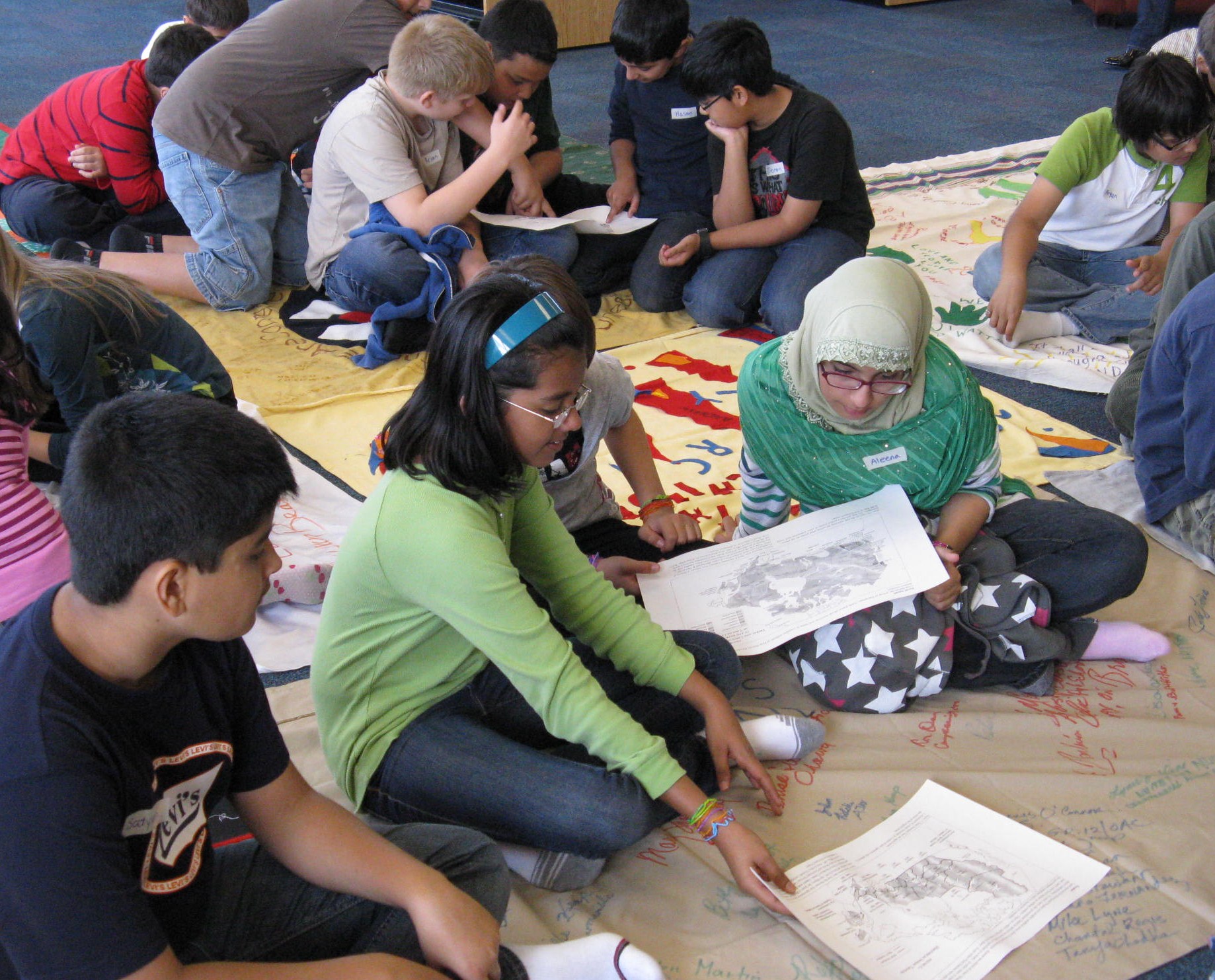
Grade six students, Mississauga, Ontario
The Indigenous Rights history we've never been taught
Fifteen years ago, the Aboriginal Rights Coalition worked with Indigenous elders and teachers to develop an interactive way of learning the history most Canadians are never taught. The Blanket Exercise was the result; it has since been offered thousands of times and was last completely updated in 2013.
This interactive piece explores a history of Canada most of us never learn, and invites us to understand the nation to nation relationship between Indigenous peoples and newcomers in this land.
It features an updated script for grade 9 through adult participants, and a new script for grades 4-8 children and youth. It includes creative ideas for events and conversations, suggested by experienced Indigenous and non-Indigenous facilitators. The third edition also includes a free downloadable kit of supplementary resources.
Visit the KAIROS shop to order a PDF or print copy of the full 52 page book, which includes both scripts, maps, and lots of process ideas.
Visit KAIROS' Blanket Exercise web page.
For order help, to discuss bulk print purchases, or if price is a barrier, please contact orders@kairoscanada.org.
For more information about the Blanket Exercise itself or when it might be happening in your area, contact Katy Quinn, Indigenous Rights Program Coordinator, kquinn@kairoscanada.org.
Media Coverage
Spirited Reflections
In this week’s Spirited Reflection JoAnne Lam, seminary intern at St. Peter’s Evangelical Lutheran Church and CPJ, explains, “In Isaiah 58:1-9a, the people of Israel struggled with the efficacy of their fasts. They had thought that God required from them only fasting from food. These individuals only approached fasting in a superficial sense…God challenged the people of Israel to live out their fasts through acts of justice in their community.” JoAnne challenges us to a new fast!
We banter around the word “justice” all the time. Here Keith Randall, one of our Presbyterian companions, grapples with what justice means and how we achieve the best results. Do you agree? What do you think? (Spirited Reflections are always posted on Facebook at Kairos: Canadian Ecumenical Justice Initiatives; please share your comments.)
Shanna Bernier works in Youth Ministry with the United Church of Canada and is mother to Bea. In this week’s Spirited Reflection she explores the injunction not to worry, as found in Jesus’ Sermon on the Mount, in light of parenthood and the world we live in.
Presbyterian minister, Rev. Alex Bisset reflects on this week’s readings from Matthew and Isaiah. The baptism of Jesus and the words of the prophet call us to more than pleasant songs about the River Jordan.
“God destined us for adoption as his children through Jesus Christ….” Our new Board Chair, Rev. Desmond Jagger-Parsons (UCC), reflects from his own perspective as an adoptive parent on this week’s scripture lessons and our joint destiny as adopted children of God.
In this homily given at Toronto’s Church of the Holy Trinity on December 15, KAIROS Member Relations and Campaigns Coordinator Sara Stratton reflects on the connections between the Truth and Reconciliation commission and the pursuit of Watershed Discipleship. What will your “acts of kindness bespeaking kinship” be?
|
|





